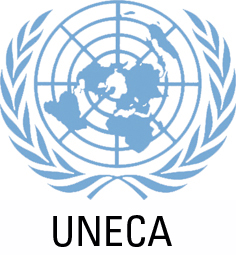Focal point
Location
P.O. Box 3001
Addis Ababa, Ethiopia
Established by the Economic and Social Council (ECOSOC) of the United Nations (UN) in 1958 as one of the UN's five regional commissions, ECA's mandate is to promote the economic and social development of its member States, foster intra-regional integration, and promote international cooperation for Africa's development.
Made up of 54 member States, and playing a dual role as a regional arm of the UN and as a key component of the African institutional landscape, ECA is well positioned to make unique contributions to address the Continent’s development challenges.
ECA’s thematic areas of focus are as follows:
- Macroeconomic Policy
- Regional Integration and Trade
- Social Development
- Natural Resources
- Innovation and Technology
- Gender
- Governance
Members:
Resources
Displaying 471 - 475 of 872Report of the implementation of the food and agricultural aspects of the Lagos Plans of Action (1980-1985)
This report seeks to look at both sides of the picture to help member countries gain an insight into the principal factors which facilitated or hindered the Plan's implementation during the period 1980-19*5. It has been prepared in response to ECA's 1986-1987 programme budget, which "quires, inter alia, an evaluation of the LPA's implementation m the food and agriculture sector within the biennium.
Report on Regional Expert Consultation on the impact of technology on rural development Africa, ECA : Addis Ababa, 4 to 8 August 1986
The basic cause of needless poverty and hunger in the rural Africa to-day is the stagnation of its main economic base - agriculture. It has settled down to a low level of equilibrium of income, saving and investment over time. Hence, most of the rural people of the region is caught in a vicious circle of a poverty trap. They are below the "absolute poverty line". The country studies show all of them are food-deficit.
Année internationale de la mobilisation de ressources financières et techniques destinées à accroitre la production alimentaire et agricole en Afrique
Au cours des deux dernières décennies, l'Afrique a graduellement perdu les moyens qu'elle avait de nourrir sa population et de financer ses investissements dans le secteur agricole. Elle dépend de plus en plus des pays industrialisés pour la satisfaction des besoins. La question logique est par conséquent de savoir s'il existe un quelconque espoir pour les populations d'Afrique.
Année internationale de la mobilisation de ressources financières et techniques destinées à accroitre la production alimentaire et agricole en Afrique
Au cours des deux dernières décennies, l'Afrique a graduellement perdu les moyens qu'elle avait de nourrir sa population et de financer ses investissements dans le secteur agricole. Elle dépend de plus en plus des pays industrialisés pour la satisfaction des besoins. La question logique est par conséquent de savoir s'il existe un quelconque espoir pour les populations d'Afrique.
Report on measures taken by African countries to reduce post-harvest food losses
This report is on output of the programme element selected to activities on reduction of post-harvest food losses- contained in the approved work programme and budget of the Commission for the biennium I986-1987. Its main objective is to report to the eighth meeting of the Technical Preparatory Committee of the Whole, to the thirteenth meeting of the Conference of ministers and to the General Assembly on measures taken by African member stats to reduce post-harvest food losses over the period 1975-1985.


